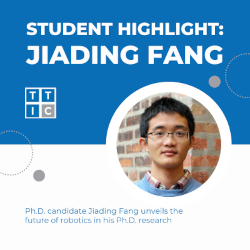
Student Highlight: Jiading Fang
In October 2018, Jiading Fang joined the TTIC community as student and Ph.D. candidate, driven by a passion ignited years earlier during studies at Zhejiang University for his bachelor’s degree and the University of Illinois at Urbana-Champaign for his master’s. Fang’s research focuses on 3D computer vision, natural language processing, and robotics. His fascination with robotics evolved into a focused pursuit of embodied spatial intelligence, envisioning robots like Baymax seamlessly integrated into human environments.
“At TTIC, I found a unique opportunity to approach robotics through a data-driven lens, leveraging machine learning to tackle complex challenges,” he shared.
His research, supervised by Professor Matt Walter, centers on understanding and interacting with the physical world in a way that goes beyond mere mechanical capability.
“I aim to equip robots with the ability to perceive and comprehend their surroundings, communicate effectively with humans, and autonomously perform tasks,” Fang explained.
His pioneering work spans semantic and geometric understanding of 3D environments, coupled with advanced reasoning and planning capabilities.
Reflecting on his proudest moments, Fang recalls the experience when his research insights were turned into the real robot demo displayed at the Museum of Science and Industry and received applause of praise.
“One of the most memorable moments is when a visitor came to our table and tried our embodied GPT demo, which allowed people to command a robot arm simply by speaking to it,” Fang said. “He told the robot to pick up his own brown leather wallet using natural language which was totally outside of our training data. But our demo did it successfully. The visitor was convinced then and we felt very proud.”
Engaging with local communities through outreach activities left a profound impact. Fang is part of the Robot Intelligence through Perception Lab (RIPL) group at TTIC, which participates in robotics demonstrations at the Museum of Science and Industry every year to young people in the South Side of Chicago. Fang has also taught a curriculum for local Girls Who Code chapters.
“Inspiring young minds through robotics demonstrations was particularly rewarding,” Fang said. “These interactions not only showcased the potential of technology but also empowered underrepresented groups of young people and students to envision themselves as future scientists when they otherwise may not have the opportunity to get these types of hands-on experiences.”
However, the journey wasn’t without challenges. Transitioning from individual research to mentoring roles and managing multiple projects have been learning experiences for Fang.
“TTIC’s flexibility allowed me to explore diverse paths, but finding initial traction was daunting,” he admitted. Yet, through collaboration and persistence, he found his stride, notably in computer vision and interdisciplinary projects.
Beyond research, Fang has cherished the vibrant community at TTIC and the cultural celebrations that fostered a sense of belonging.
“The supportive environment made TTIC feel like a second home, especially with the cultural events that TTIC funds and supports, such as our Chinese New Year celebration,” he reminisced.
As he prepares for the next stage of his journey, Fang emphasizes the importance of communication with mentors and staying focused on impactful research. “Your advisor is a valuable guide,” he advises, “and it’s crucial to align your goals with your passion.”
Looking ahead, Fang remains committed to pushing the boundaries of robotics, driven by a vision where intelligent machines coexist harmoniously with humanity.
“The future of robotics lies in our ability to understand and adapt to the complexities of our world,” he concluded, envisioning a future where robots like Baymax are not just a dream but a tangible reality.
Jiading Fang’s personal website can be found at fangjiading.com, and he can be reached at fjd@ttic.edu.

